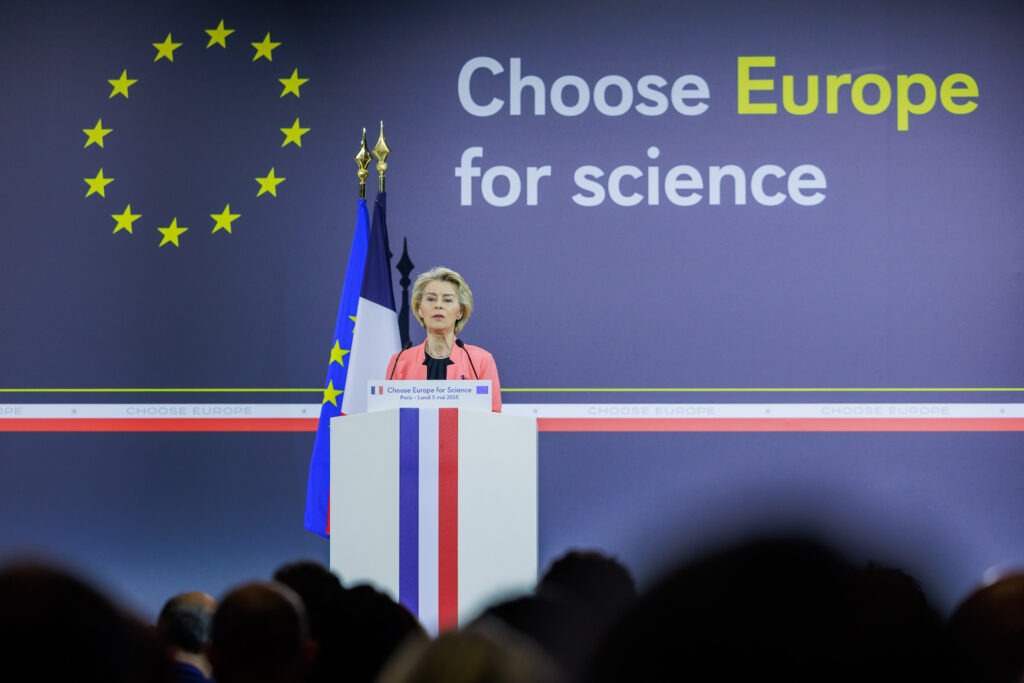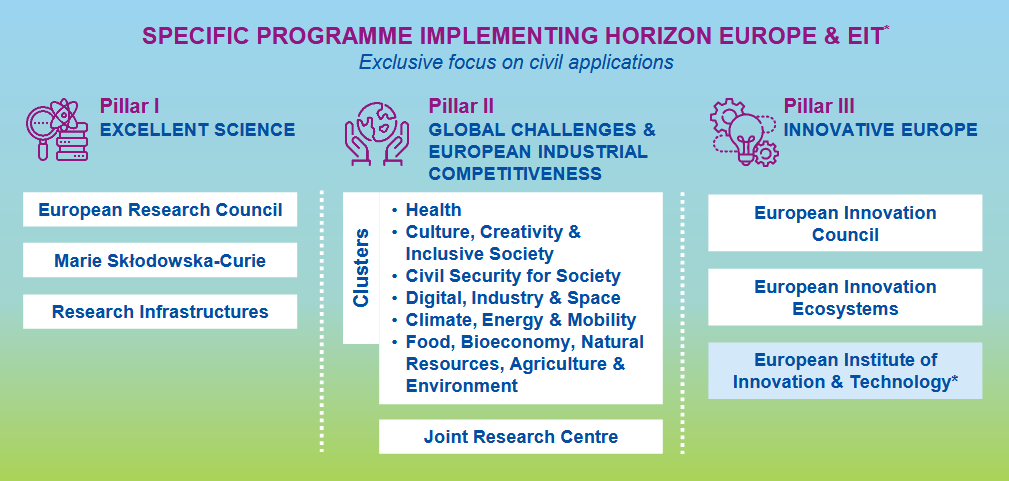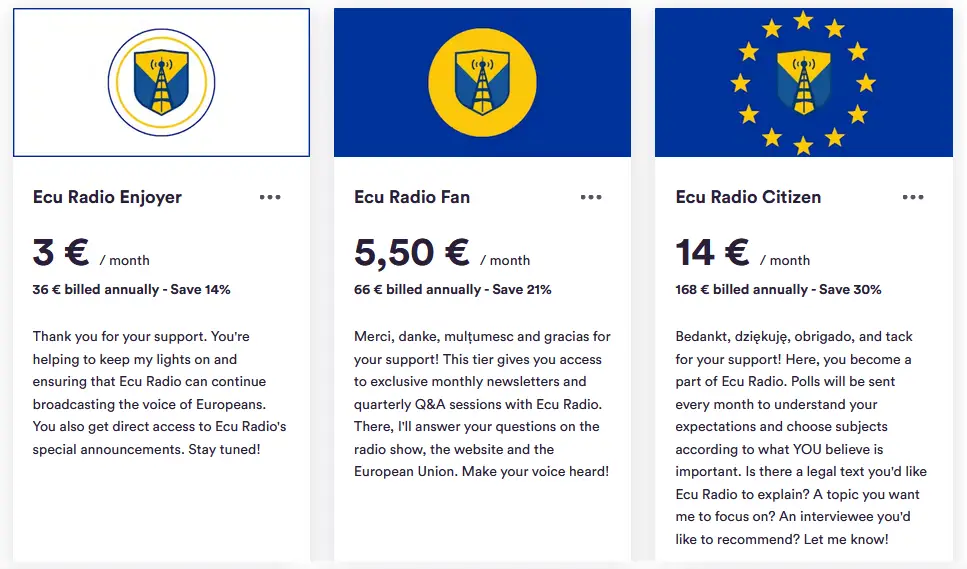Today, the University of La Sorbonne in Paris, France, launched its “Choose Europe for Science” initiative, promoted by French President Emmanuel Macron. For this event, Commission President Ursula Von Der Leyen visited the university and gave a closing speech. In her address, she emphasised why Europe is an ideal destination for scientists, detailing several existing programs the European Union funds and supports, as well as well a new one: “Choose Europe”. Let’s take this opportunity to review these initiatives through her words.

Horizon Europe

Horizon Europe is the EU’s main funding programme for research and innovation. It was established with the ambition to make Europe a leader in innovation, recognising that the Union’s investment in Research & Development lagged behind other global players (1.5% of its budget compared to 2.1% in the USA, 2.6% in Japan, and 3.6% in South Korea at the time of its conception).
With a substantial budget of indeed €93 billion to be spread between 2021 and 2027, its funding is directed towards three main pillars.

It aims to:
- Tackles climate change.
- Helps to achieve the UN’s 17 Sustainable Development Goals (including quality education, affordable energy and responsible consumption).
- Boosts the EU’s competitiveness and growth.
- Facilitates collaboration and strengthens the impact of research and innovation in developing, supporting and implementing EU policies while tackling global challenges.
- Supports the creation and better diffusion of excellent knowledge and technologies.
- Optimises investment within a strengthened European Research Area, the single, borderless market for research, innovation and technology across the EU.
Among the initiatives supported by these pillars, three organisations stand out, either by being directly named or hinted at by Ms. Von der Leyen in her speech:
1. The European Research Council (ERC)

With €16 billion allocated out of the total €93 billion for Horizon Europe, the ERC is the principal EU funding organisation for frontier research. It funds top researchers from anywhere in the world to run projects based across Europe, covering all fields, with the goal of pushing the frontiers of knowledge. The sole criterion for funding consideration is scientific excellence, a keyword frequently emphasised in their communication.
As mentioned, the ERC is led by an independent governing body called the Scientific Council, composed of scientists whose expertise spans either Life Sciences, Physical Sciences, and Social Sciences. Each sector has its own Vice-President.
The ERC is also poised to become a pivotal instrument for attracting researchers. During her speech, Ms. Von Der Leyen announced that the Commission will “put forward a new €500 million package for 2025-2027 to make Europe a magnet for researchers. We [also] aim to create a new 7-year “super grant” under the ERC to help offer a longer-term perspective to the very best.”
But what about the second organisation she mentioned?
2. The Maria Skłodowska-Curie Actions

These actions, named after the famous French-Polish researcher Marie Skłodowska-Curie, aim to support researchers from all over the world at all stages of their careers, with a focus on their training, skills, and career development. The MSCA also support institutions through doctoral and postdoctoral programmes, and collaborative projects. Furthermore, they foster cooperation beyond academia, notably with industry and SMEs.
More practically, the MSCA boasts several successes:
- Nobel Prizes from former fellows: In 2020, former MSCA fellow
Emmanuelle Charpentier together with Jennifer A. Doudna received the Nobel Prize in Chemistry “for the development of a method for genome editing”. Other MSCA fellows and supervisors also won prestigious awards, including 9 Nobel Prizes and 1 Oscar. - Support of over 65 000 researchers from the EU and beyond, including 25 000 PhD candidates. They have also financed more than 1 000 doctoral programmes.
3. The European Innovation Council (EIC)

While not directly named in this specific quote, such an initiative aligns perfectly with the mission of the EIC. Describing itself as “Europe’s flagship innovation programme,” the EIC has a budget of approximately €10 billion dedicated to supporting start-ups, SMEs, and research teams in developing high-risk, high-impact breakthrough innovation and scaling them up.
Delving deeper, its portfolio is focused on three key sectors:
- Digital, Industry, and Space: This includes Advanced Manufacturing and Materials; AI, Data, and Information/Communication Technology; Quantum, Advanced Computing, and Semiconductors; Space.
- Green: This covers Agriculture and Food; Climate and Environment Tech, Energy, Mobility, and Built Environment (architecture, design, infrastructure resilience, etc.).
- Health: Focused on Biotechnologies and Medical Technologies.
In their latest Impact Report (2025), the EIC outlined significant achievements: generating a pipeline of over 1,350 unique innovations, supporting over 700 startups and SMEs across 30 countries, crowding in over €2.6 billion of additional investment, and leveraging over 3 euros of investment for every euro invested through the EIC. Notably, they also focus on ensuring that European innovation remains in Europe, offering funding of up to €30 million per company, which in turn can catalyse investment rounds above €100 million, aiming to scale up critical technology companies in digital, biotech, and clean tech.
But Ms. Von Der Leyen didn’t mention organisations or initiatives working under the Horizon Europe umbrella only. Next is:
EuroHPC

EuroHPC stands for “European High-Performance Computing.” With a 6-year budget of €6 billion, its role is to develop a “Supercomputing Ecosystem” by pooling the resources of the European Union, European countries, and private partners in a Joint undertaking (JU) to “develop, deploy, extend and maintain in the EU a world-leading federated, secure and hyper-connected supercomputing, quantum computing, service and data infrastructure ecosystem”.
To date, the EuroHPC JU has procured ten supercomputers and eight quantum computers across Europe. Additionally, they were recently joined by thirteen AI Factories leveraging the existing infrastructure to support SMEs or Startups within the AI field. Finally, there are plans of creating Gigafactories, five large-scale facilities equipped with approximately 100,000 AI chips (four times more than current AI factories) with the mission to train and develop complex AI models at an unprecedented scale and maintain the EU’s strategic autonomy in critical industrial sectors and science.
A public consultation is currently underway to better understand how to make this vision a reality.
CERN

The European Organisation for Nuclear Research, known as CERN, is not an initiative of the European Union per se but warrants a mention as a significant European initiative and success. It operates the largest particle physics laboratory in the world, is home to the world’s largest particle accelerator (27-kilometre long) and is behind numerous scientific achievements such as the invention of the World Wide Web by British scientist Tim Berners-Lee.
Choose Europe

The latest addition, the “Choose Europe” initiative, aims to position European innovation competitively on the global stage. It seeks to explain, support, and encourage researchers and innovators alike to come to Europe for their scientific endeavors. To achieve this goal, it will rely on several key elements:
- A €500 million package for 3 years.
- Promoting the free movement of knowledge and data across Europe, potentially establishing it as a Fifth Pillar of free movement, alongside goods, services, capital, and workers.
- Ensuring freedom of scientific research is enshrined in law through a new European Research Area Act, which can be seen as a response to challenges faced by science and intellectualism globally. Something the Commission President the War on Science as well as a “gigantic miscalculation”.
- Implementing a European Innovation Act and a Startup and Scaleup Strategy designed to remove regulatory and other barriers and facilitate access to venture capital for innovative European startups and scaleups. This objective aligns with the AI Continent Plan, also going for less regulations and barriers when it comes to innovation.
- Improving connections for highly skilled workers and researchers, and streamlining entry procedures for top researchers, as also highlighted in the paragraph on the ERC.
As Ms. Von Der Leyen articulated, “We want scientists, researchers, academics and highly skilled workers to Choose Europe.”
Diving Deeper within European Innovation and Science
If you want to learn more about the multiple scientific organisations and initiatives done across the European Union, numerous supporting materials are available for deeper dives:
- A Presentation of Horizon Europe through the Research & Innovation programme for the 2021-2027 period.
- The Horizon Europe, Open Science Factsheet, to be downloaded in a PDF format
- The European Research Council’s Work Programme for 2025
- The European Innovation Council’s Impact Report for 2025
- EuroHPC’s Multi-Annual Strategic Programme
Ecu Radio needs your support
Ecu Radio is an independent news website and podcast show, run full-time by a single dedicated contributor (for now). Support our work, get exclusive perks and help keep us going, starting from only 3 € per month. Let's unleash Europe's potential together!
Click here to support Ecu Radio

